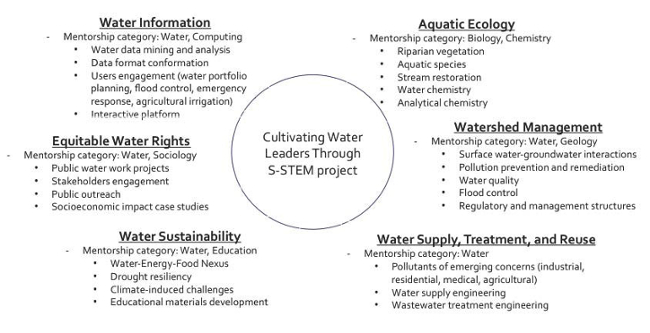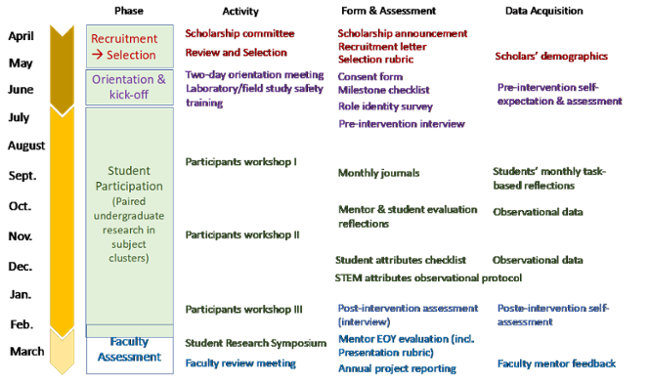Water Security for Texas: Creating Educational Pathways and Cultivating Leadership for the Water Work Force
Sponsored by the National Science Foundation: Scholarships in Science, Technology, Engineering, and Mathematics Program ( S-STEM)
Over its five-year duration (2021-2026), this federally-sponsored project will fund scholarships to 33 unique full-time students pursuing bachelor’s degrees in Biology (BIOL), Water Resources Science and Technology (WATR), Mathematics (MATH), Electronic System Engineering Technology (ESET), and other natural and physical science majors. The scholarship recipients (scholars) will primarily include both first-year students and third-year students (including transfer students). Scholarships are renewable, pending on performance evaluation over the awarded period. This project will leverage the scholarship, mentorship, and direct involvement of students in research as the pathway to achieving student success. The project’s unique feature is the formation of undergraduate research and outreach clusters concentrating on tackling the water resources challenges for a region projected to experience one of the fastest growths in the nation. While the mentoring activities may vary by discipline, the faculty mentors will align their co-curricular activities with the core idea of experiential learning involving field studies, social engagement, and need-based research. The faculty-led undergraduate research activities will include but not limited to: (1) The analysis of water security in the increasing urbanized areas of south-central Texas, (2) low-impact restoration and development in sensitive watersheds; and (3) Socio-economic impact of water equality. The project will also support curriculum improvements to increase the retention and graduation of this student population.

If you have any question about the project or scholarship information, please contact:
Prof. Walter Den, Water Resources Science and Technology
Department of Mathematical, Physical, and Engineering Sciences
(210)784-2815
wden@tamusa.edu
Project Description
The project specifically aims to leverage the scholarship program to identify the unique attributes of STEM-talented and to validate the rationale behind the selection criteria of the scholarships. Promoting an active learning environment has long been recognized as a crucial element to motivate and inspire under-represented students. However, the importance of developing a scientific identity has not been clearly demonstrated as part of effective high-impact practices. The project investigators hypothesize that learning activities built on a coherent subject matter of regional and social significance will instill a sense of scientific identity and bolster the academic achievement of scholars. As such, the project will design a scholarship program to better understand how to maximize its effectiveness, from the standpoint of scholars’ performance improvement, by incorporating various supporting activities to help scholars develop a sense of scientific and professional identity. It will also differentiate the effects of scholarship selection criteria, length of scholarship, the status of cohorts, and the types of mentorship practices on the academic achievement of the scholars. The project will be evaluated using performance metrics from both faculty mentors (types of practices and their duration and frequency) and scholars (academic performance, retention to graduation, graduate school matriculation). It will especially value the ability and aspiration of the scholars to matriculate in graduate schools because of its long-lasting impact on the transformation of local communities. The results of this project will be made available through campus-wide seminars, grade school teachers workshops, STEM education and professional conferences, and peer-reviewed publications. This project is funded by NSF’s Scholarships in Science, Technology, Engineering, and Mathematics program, which seeks to increase the number of low-income academically talented students with demonstrated financial need who earn degrees in STEM fields. It also aims to improve the education of future STEM workers, and to generate knowledge about academic success, retention, transfer, graduation, and academic/career pathways of low-income students.
OBJECTIVES OF OUR RESEARCH STUDY:
Objective 1: Cultivate faculty-student mentorship and formulate innovative learning assessment tools that would elevate their academic and career success.
Objective 2: Challenge conventional STEM-discipline teaching outcome by focusing co-curriculum designs onto an applied field with critical socio-techno-economic implications (i.e., water-related issues). The expected outcome of this objective is to prepare students with skills to fit in today’s job market and prepare them to be an impactful player in his/her career.
Objective 3: Identify the academically motivated STEM students in the existing demographic profile that can meet the scholarship requirements.
Objective 4: Leverage the S-STEM project to frame a future recruitment strategy of STEM students (including transfer students) and revise the curriculum to advance our STEM programs.
Project Leadership & Faculty Mentors
Faculty mentorship through scientific research experience is the core component of our project activities encompassing multiple activities, including first-year research experiences, upper-division undergraduate research projects, and peer-peer mentorship. The following is a summary of faculty mentorship for the S-STEM project.
|
Dr. Pride Abongwa |
Dr. Elizabeth Borda |
Dr. Walter Den |
Dr. Esther Garza |
|
Dr. Marvin Lutnesky |
Dr. Joseph Simpson |
Dr. Jose R. Valdez-Barillas |
Dr. Megan Wise de Valdez |
Project Evaluator
Dr. Ramona Pittman, Associate Professor of Reading, Educator & Leadership Preparation, serves as the Project Evaluator. She will perform independent project evaluations by reviewing progress, interviewing faculty and student participants, conducting annual evaluations, and reporting evaluation outcomes.
Scholarship Information
Background Information
The purpose of this study is to assess the effect that an active learning environment and high impact practices such as undergraduate research, common experiential learning, mentorship and collaborative projects have on the STEM GPA and scientific identify of the project participants
Procedures
If you agree to participate in this study, we will ask you to do the following tasks:
Engage in scholarly activities under the supervision of an academic mentor, participate in regular workshops and complete follow up evaluations, assessments, questionnaires, and reflection that will assess your progress. You will also receive training on scholarly best practices, apply them by participating in collaborative research projects, and generate a deliverable product in the form of written or oral communication.
Risks and Benefits of Participating in the Study
The study includes the following risks:
First, working in a laboratory setting, which will require handling chemicals, instrumentation, and equipment that if not used properly may increase risk. Second, working outdoors collecting environmental and biological data while walking on irregular surfaces, exposure to sun, and potential allergens.
Risks are contingent upon the students’ level of responsibility and will be significantly minimized after having received all necessary training and provided with adequate personal protective equipment under faculty supervision.
The benefits to participation are:
Student will learn methodological and conceptual skills in STEM related areas. The student will have the opportunity to present the work accomplished at local and regional conferences. The student will participate in several scholarly activities that should improve their level of preparedness for graduate school or job.
If changes to the potential or actual risks or benefits to you occur, then you will receive a report of significant new findings and/or be asked to re-consent.
Compensation
By being selected for this study, the student will be eligible to receive a National Science Foundation (NSF)-sponsored scholarship. The amount of S-STEM scholarship awarded is $7,091 per year. This scholarship is on a yearly cycle, renewable only at the discretion of the project’s scholarship committee. Please visit here to apply.

